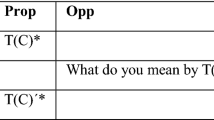Abstract
A recognition of the acutely terministic and agonistic character of philosophizing has led to the perception of a dilemma in philosophical debates: differing positions are capable of being maintained only at the expense of ‘mutual unintelligibility,’ and a real ‘contact of minds’ could never be achieved without one side of the controversy abandoning its position and the enabling argumentative tension ceasing to exist. This perception is sustainable, however, only if we continue to accept the assumption that a direct, unmediated confrontation between disputants personifying two sets of rigidly defined terms is the mode of philosophical argumentation. A triadic rather than diadic conception of a typical debate between opposing schools of thought, which differentiates between the opponent and the audience, would address the theoretical misgivings caused by the perceived predicament.
Similar content being viewed by others
REFERENCES
Bar-Hillel, Yehoshua: 1962/1992, ‘A Prerequisite for Rational Philosophical Discussion’, in Richard M. Rorty (ed.), The Linguistic Turn: Essays in Philosophical Method with Two Retrospective Essays, University of Chicago Press, Chicago, pp. 356–359.
Derrida, Jacques: 1982, Margins of Philosophy, The University of Chicago Press, Chicago.
Davidson, Donald: 1990, ‘A Coherence Theory of Truth and Knowledge’, in Alan R. Malachowski (ed.), Reading Rorty: Critical Responses to Philosophy and the Mirror of Nature (and Beyond), Basil Blackwell, Oxford, pp. 120–138.
Habermas, Jürgen: 1984, The Theory of Communicative Action, Vol. 2, Beacon Press, Boston.
Meiland, Jack W. and Michael Krausz (eds.): 1982, Relativism: Cognitive and Moral, University of Notre Dame Press, Notre Dame.
Richards, I.A.: 1991, ‘Toward a Technique for Comparative Studies’, in Ann Berthoff (ed.), Richards on Rhetoric, Oxford UP, N.Y., pp. 38–51.
Rorty, Richard: 1989, Contingency, Irony and Solidarity, Cambridge University Press, Cambridge.
Rorty, Richard: 1995, ‘Response to Frank Farrell’, in Herman J. Saatkamp, Jr. (ed.), Rorty and Pragmatism: The Philosopher Responds to His Critics, Vanderbilt University Press, Nashville.
Siegel, Harvey: 1987, Relativism Refuted: A Critique of Contemporary Epistemological Relativism, D. Reidel Publishing Company, Dordrecht.
Tollefsen, Olaf: 1987, ‘The Equivocation Defense of Cognitive Relativism’, in Steven J. Bartlett and Peter Suber (eds.), Self-reference: Reflections on Reflexivity, Martinus Nihjhoff, Dordrecht, pp. 209–217.
Author information
Authors and Affiliations
Rights and permissions
About this article
Cite this article
Liu, Y. Unintelligibility or Defeat: The Issue of Engagement in Philosophical Debates. Argumentation 11, 479–491 (1997). https://doi.org/10.1023/A:1007724314222
Issue Date:
DOI: https://doi.org/10.1023/A:1007724314222



